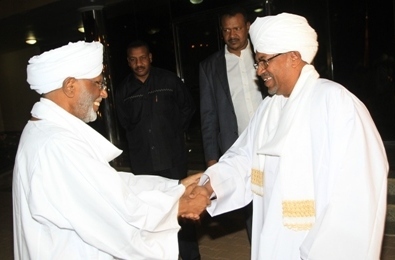Turabi calls for a two-year transitional government in Sudan headed by Bashir
January 2, 2016 (KHARTOUM) – Secretary General of Sudan’s Popular Congress Party (PCP) Hassan al-Turabi said that dialogue is the only option to overcome the national crisis, pointing his party calls for a two-year interim government headed by president Omer al-Bashir.

He called for establishing good governance that is based upon law, respect for human dignity and commitment to rights and duties, demanding the review of previous governance experiences.
The Islamist leader warned that Sudan is currently facing the dangers of conflicts and disintegration for domestic and external reasons.
“We fear [that Sudan could face the danger] of Somalization or [the fate of countries] surrounding us such as Syria, Libya and Yemen,” he said
“It is high time to end the crises and stop the war in Darfur, South Kordofan and Blue Nile as well as [facing] the external threats and the economic hardships following the secession of South Sudan which led to the loss of 50% of the oil revenues,” he added
Turabi pointed that Sudan is witnessing major changes due to the large increase in the number of colleges and the widespread use of modern means of communication, saying dealing with those developments requires new kind of thinking.
He said his party accepted to participate in the national dialogue initiative launched by President Bashir due to recent developments, noting that all political parties chose to engage in the dialogue.
“Dialogue has become a strategic choice that is adopted by the [political] parties and the armed groups and even the Western nations were convinced [that it is the only option] due to the high cost of conflicts,” he said
The government-led national dialogue conference was inaugurated in Khartoum on October 10th amid large boycott from the major political and armed opposition.
The Islamist leader disclosed that the government and the rebel Sudanese People’s liberation Movement/North (SPLM-N) have made progress in the security talks on South Kordofan and the Blue Nile particularly with regard to the ceasefire and the humanitarian issues.
Turabi added that he was convinced that dialogue can’t achieve the entire demands of the opposition, saying the transition could be achieved by negotiating issues under discussion.
“Many ideas and papers were being presented [to the dialogue] six committees and the outcome of the [dialogue] would establish the bases for the transition,” he said
“ Several views have been laid out [in the dialogue] including amending the constitution, interim period, institutions of governance, formation of a mini government, introducing a post of a prime minister and the continuation of the [current] National Assembly to amend the constitution,” he added
He said that his party called for a two-year transitional government to be headed by President Bashir and a cabinet with large executive powers besides keeping the current legislative institutions to approve the outcome of the dialogue.
“General elections should be held following the end of the interim period and the incumbents of the constitutional and legislative posts wouldn’t be allowed to participate in it. The elected Constitutional Assembly would approve the country’s permanent constitution. Presidency would be rotated among members of a council of states that is formed in a manner to reflect diversity in Sudan,” he said.
He stressed that no party participating in the dialogue would achieve 100% of its objectives, noting the ultimate goal of the dialogue is to resolve the country’s crises, maintain its unity and agree on a permanent constitution.
The PCP was among the first political forces to approve Bashir’s call for the national dialogue. Also, the lslamist party is the only significant political force that didn’t suspend its participation in the process.
(ST)
